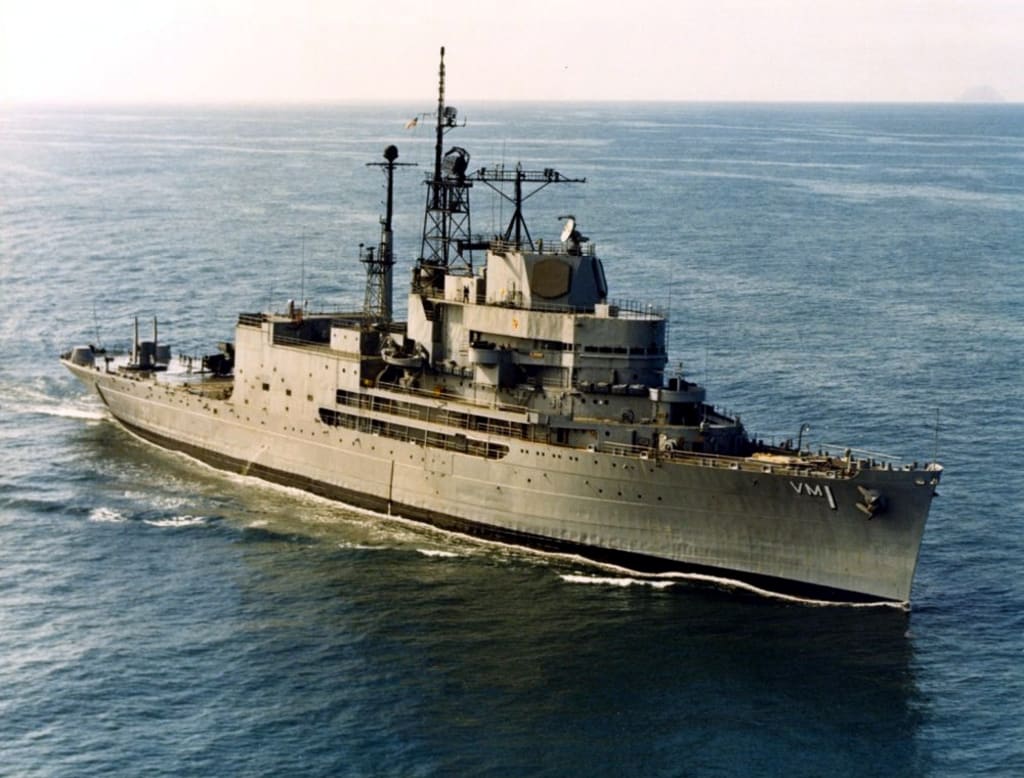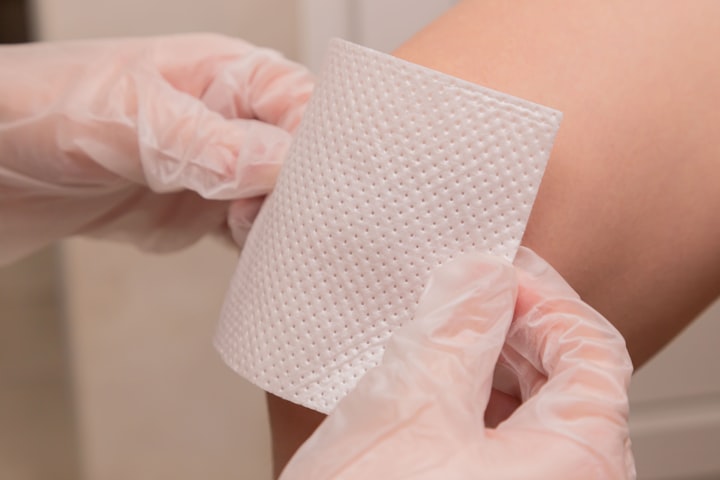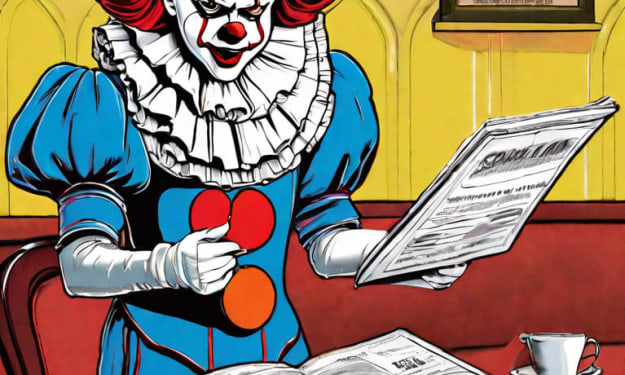Bilge Water Baptism
Passing Ships Challenge

“Is it clogged?” a voice called from above.
“Well,” I called back. “I’m standing in chest high water with about three inches of hydraulic fluid floating on top. Something’s keeping the pump from draining.”
“You’re gonna have to clear it out.”
I tried. I really did. I tried to reach down and figure out what had clogged the bilge pump. The bilge is the lowest part of a ship, a place that collects water, oil, lubricants, and anything else that flows down. Bilges have pumps to clear water out so compartments don’t become water logged.
Bilges are also supposed to pump out the liquid nastiness that seeps down so it doesn’t become even more nasty. This bilge was at the bottom of the magazine of a missile launcher; if the propellant in the missiles got wet, it would be a disaster.
Our bilge was clogged. I couldn’t reach the obstruction. Couldn’t root it out with a broom handle. Couldn’t grab it with grippers. Nope, I had to go in after it.
The water was slowly rising. If it kept up, the propellant in the missiles would get wet, which could be dangerous in more ways than I care to mention.
Shaking my head, I said something wise like “Why the hell do I have to do this?” and I dove under the water.
***
My decision to go into the Navy wasn’t what you would call a well thought out process.
First, my goal in life was not to be a teacher.
My parents were teachers.
My grandparents were teachers.
My uncles were teachers.
People in our family have a genetic predilection for taking jobs that are high stress, demand long hours, and have low pay. There’s some condition that makes them think, upon the painstaking process of completing higher education, “Hey, why don’t I be a teacher?”
I had a foolproof plan to avoid becoming a pedagogue.
You have to have a college degree to be a teacher.
If I didn’t go to college, I couldn’t be a teacher!
It seemed like a good idea at the time.
My other reason to go into the Navy involved a girl I was trying to impress.
This is not to blame her. It is no fault of hers that I was an idiot. Amorous hormones were just another factor in my making a hasty decision.
***
Joining the Navy meant I could get away from El Paso, my hometown—away from family, who might try and trick me into teaching, away from their influence, away from my friends, who were all going to college. Afraid I might be subject to peer pressure and hastily enroll at an institution of higher learning, I sought to get as far away from the Texas/Mexico border as possible.
“As Far as Possible” translated to Great Lakes Naval Training Center, in the Chicago area. There was a lot I liked about Chicago. It was my first big city, and I was fascinated by the tall buildings, the fast paced life, the commuter trains, restaurants (I still go to the Berghoff anytime I’m in Chicago).
But Great Lakes had two downsides.
First—and worst—it was more school. I joined the Navy so I didn’t have to go to college, so what did the Navy do? It sent me to school—to sit in a friggin’ classroom for a whole year. Basic Electricity and Electronics (which sailors called “Beep”), Gunner’s Mate A school, and later, C school. Let’s say it took me a year to get out to the Fleet.
Second, and nearly as bad, was Chicago is effing cold. I’m not talking nippy, I’m not talking chilly, I’m talking Coldest Winter on Record, Lake Michigan Freezing Over and Blazers Drive On it, Waist High Snow and Twenty Three Degrees Below Zero and I had to work outside. I have to admit—it was the cold that first made me question my decision to join the military and bypass college.
My resolve wavered, but I held fast.
Somehow, the Navy tried to do my parents’ work for me. There were a couple of guys in my gun school that were really struggling with the material. The instructors would drone on about whatever the topic was, they would look lost, and they’d fail the test at the end of the week.
If they failed too many tests, they’d get kicked out of the program and be sent to the fleet with no rating—which meant they didn’t have a specialty, which meant it would be hard for them to make any rank (earn promotions). Going to the fleet without a rating was the hardest path in the Navy, a fate none of us wanted.
Plus, these guys were my buddies.
Then, this jerk instructor started talking s**t about guys from Texas and how dumb we were. I decided I would show him, so I studied extra hard and got a perfect score on the exam on the unit Jerk Instructor was teaching, just to show him! (I now think that he didn’t hate Texans but was just trying to give me a little bit of motivation. I don’t really think my parents put him up to it, but it’s the kind of thing they might have done).
So when I busted out with a perfect score on what was supposed to be a hard section of our course, my struggling buddies asked me for help. So I did. Several times a week. I asked them questions, went over material with them, had them make up little rhymes so they could remember things like what the color codes on resistors meant. I wasn’t teaching, I told myself. Just helping a brother or two out. The buddies I was helping out passed the course.
***
I loved being at sea. I loved being out on the ocean, a thousand miles or more away from land, I loved the way the Pacific turned many shades of blue throughout the day, and I loved the constant sea breeze that was clean and pure. I loved watching dolphins play in the wake of the ship, or how flying fish would race by, sometimes sailing the entire length of our vessel before plunging back, down into the water, only to soar again.
Watching a whale breach was practically a religious experience. Hearing the seals bark and play when we went in and out of port was endlessly entertaining. Sunrises at sea a thousand miles from land were magical; sunsets were better. Seeing the milky way on a moonless night made me feel like I was in the presence of some beautiful but unfathomable mystery.
***
“Be careful, Chuck,” said the voice from above. “Don’t get your fingers caught when you clear the pump”
“Thanks a lot,” I said.
Then I took a breath, clamped my eyes shut, and submerged.
As I descended, I could feel the hydraulic flued coat my clothes, my skin, my hair.
Forcing myself down, I fumbled blindly toward the drain where water entered the pump.
I felt a lot of soft, squishy, cold, gross stuff.
***
I loved being at sea.
I did not love being in the Navy. I didn’t mind the discipline—I’ve never had a hard time getting up or getting to work early on time. Maybe it’s because I was raised in Texas, but I’ve never resented addressing people who were older than me as “Sir” or “Ma’am.” I didn’t even mind the uniforms—when I was in, the sailors wore bell bottomed dungarees and denim work shirts, and I thought they looked pretty cool. I would have preferred to wear my hair longer, but I was content to wear it as long as military regulations would let me.
Petty tyranny is what I couldn’t stand.
I know that every profession has its share of despots—people who, when they get a little bit of authority, like to lord it over others. Rather than lead—“Let’s get this place cleaned up so we can all go home”—they order “This place looks like shit. You’d better pick it up” (usually followed by standing around and watching others work, or criticizing the work that is done).
There were quite a few of these Little Napoleons in the enlisted ranks. Their tyranny stemmed largely from laziness. Their ideal was to stand around, sip a cup of coffee, and watch other people do the work. “Supervising” is what they called it. Although it was irritating, their silly expressions of authority weren’t malicious. The best revenge was to actually work—whenever an officer came by, saw that I was working alongside people with lower ranks than I, the coffee cup holder was scolded with a comment like, “Why the hell is Etheridge busting his butt while you’re standing around doing nothing?”
Worse were a certain type of officer, the ones who felt like they had authority, so they had to exercise it. The worst was a Lieutenant Junior Grade named Johnson. When I was the duty Gunner’s Mate, he would wait until 15 minutes before lights out, call down to the berthing compartment, have me get dressed and meet him in the hall outside the aft missile launcher.
“Pick that shit up,” he’d say.
I would bend over and pick up a single cigarette butt. “Yes, sir.”
He’d stare at me for a long time, light another cigarette, and walk away.
I’m not saying that he dropped that first cigarette butt. He might have.
He was neither intelligent nor hard working. He knew little about the equipment we had to work on and would give us irrelevant advice or issue orders that didn’t make sense. Fortunately, he was so clueless he never did any real harm, and his lack of technical expertise kept him from causing the kinds of disasters that can happen when you have heavy equipment like missile launchers which are equipped with, among other things, missiles.
The only reason he could boss me around was because he had a college degree and I didn’t.
This was another crack in the wall I’d built between myself and higher education.
***
Underwater in the dark with closed eyes, I felt for whatever it was that was cold, wet, and squishy. I pulled as much of it out as I could before I ran out of breath and stood up rapidly, bursting out of the water so quickly the person upstairs yelped “Shit!”
I gasped, letting the water drain off me, and then I asked, “Got a rag?”
“Sure.”
A dry rag hit my hand. I wiped my face until I had enough of the gunk off of it that I could open my eyes. “That’s gross,” I said, eyeing the lump of stuff in my other hand.
“What is it?”
I looked closely. “Mostly old rags, some paper, a couple of food wrappers. All covered in an appetizing layer of grease and oil. Kind of like a nasty Kit Kat bar.”
“That’s gross, Chuck.”
“I didn’t get it all.” I looked up. “Want to take a turn?”
“No point in both of us getting dirty…”
I glared up at the guy above me, handing him the lump of crap I’d fished out of the bottom of the bilge. Then I took a breath and went back down.
***
I got good technical training in the Navy. I learned digital logic, a bit of basic programming, how circuits worked, and how to troubleshoot electronic problems. The problem was I almost never got to use this training. My job was to help maintain the aft missile launcher, which basically meant I was a grease monkey who studied electronics. I knew how the systems worked and understood how the electronic control systems operated the heavy hydraulic driven machinery.
But the electronics system never broke, and rarely required maintenance. But the hydraulics system did, and there were daily, weekly, and monthly maintenance we had to do on all kinds of systems. Greasing valve blocks, some of which were more than twenty feet in the air. Adding or removing hydraulic fluid. Making sure fire suppression systems worked.
And then there was molybdenum. It’s this thick grease. Imagine the lead from a pencil converted to a thick, viscous cream the consistency of diaper paste. Missiles were raised and lowered on launcher rails that had to be lubricated. Every week, we had to remove all the grease from the launcher, which was outdoors and exposed to the elements, and had to regrease the rails. Two rails more than twenty feet long—cleaning and regreasing was slow, agonizing work. The launcher had to be maneuvered so it was parallel to the deck so the rails could be cleaned.
I was the only one on the launcher crew tall enough to work on the rails without standing on something. The other guys could and did help by standing on ladders or chairs to reach the rails, but that only worked when the ship was in port. When we were haze grey and underway, it wasn’t safe or practical for people to stand on something to strip and regrease the launcher rails. The ship would pitch and roll, and they’d fall off of whatever they were standing on. I was the only one who could do the job.
Molybdenum grease got everywhere. If you even got a spot of it on your clothes, it would never come out. Even if you didn’t know someone, you could tell they were a gunner’s mate by the molybdenum grease on their clothes. Sometimes we wore coveralls to protect our uniforms, but molybdenum grease penetrated everywhere, going right through the protective cloth of the coverall through to your uniform and through to your skin.
You could never really get it out, no matter how hard you scrubbed—lava soap, various ‘hand cleaners,’ vigorous scrubbing—once you got molybdenum on you it was there until you shed the skin cells it fell on.
I still have nightmares about molybdenum grease.
***
The second time under water and layers of oil, I had a kind of physical sense of where the problem was down in the bilge, so I grabbed as many chunks of the noxious stew still clogging the pump as I could. It was tricky because I had to hold onto the chunks. If I let go, they would stay in the water and work their way down until they were plugging the pump again.
At first, I grabbed with both hands. When both hands got full, I shoved all the chunks under one arm and kept grabbing till I could hold no more.
I burst up through the water again.
“Shit! Scared me again,” said the guy above me.
“Here’s a present,” I said, giving him handfuls of oil-soaked rags and paper and chunks of I don’t want to know what it was.
“The water started going down for a bit, but then it stopped.”
“Yeah. I cleared the pump partway, but then whatever I stirred up got caught in the pump again.”
“I guess you have to get the rest of it.”
I looked down. “This uniform’s never going to come clean,” I said.
“Dude, I’d throw it away.”
“Then I’d have to buy a new one.”
I took one more breath, held it, and descended one more time.
***
The worst part was the boredom. When we worked, we did physically demanding labor that required our full attention, because the work was dangerous. If our attention wandered, we could get hurt—fall, get shocked, get a hand or our whole body caught in machinery. Worse, we could hurt someone else. We worked long hours.
When we weren’t working, there wasn’t a lot to do. Movie nights were occasionally held in the ship’s hangar deck, and I would go, even though the projector was old and the sound system wasn’t good. There was a library, which very few people went to, but it didn’t take me long to read all the books I was interested in. Also, sitting around reading was frowned upon by pretty much everyone in my division, so I tried to limit my reading so I wouldn’t seem too odd to my fellow sailors.
There were any number of floating poker games and other forms of gambling, which I tried. I actually won a couple of hundred bucks, but I was so paranoid about losing money I didn’t’ enjoy it. Some sailors did drugs; most got caught and got in more trouble than I cared to have to deal with. Ours was the first ship to have both women and men serve on board, and a few couples had romantic trysts in out of the way compartments, but I never did.
Unless we were near a city big enough to have television stations, there was no TV. This was well before personal computers or cell phones so there were few electronic devices. A couple of the computer types pitched in and bought an Atari console, and they’d occasionally let me join them up in “Magic Mountain,” the area of the ship which conducted electronic warfare, and we’d play Space Invaders on a large television mounted on a wall.
But mostly, it was time, time with little to do that interested me. I had friends; the whole launcher crew was pretty tight and we hung out when we were on shore, but you can’t work all day with the same group and spend every night with them without getting on each other’s nerves. After the work day, we’d all withdraw from each other.
There were moments of excitement—drills, sightings of foreign war ships, the occasional live fire drills, horrible weather. But, as anyone who’s ever served in the military will tell you, life is mostly soul numbing boredom punctuated by moments of adrenaline or, occasionally, terror.
***
Underwater with eyes closed one more time, I kept grabbing chunks of stuff until I felt a whoosh, and I could tell that the pump was flowing freely. It would take a while, but the bilge would empty and the launcher magazine would be safe again.
I rose more slowly, coming out of the water, feeling it and the hydraulic fluid flow off me.
After wiping my face, I opened my eyes.
Then it hit me.
Maybe sitting in a college classroom isn't that bad.
***
That moment changed my life. Up to then, I’d defined myself by what I wouldn’t do. I’d let my desire to reject the life my parents had chosen push me down a path that I didn’t enjoy and that didn’t make me happy. After deciding that going to college was an infinitely better choice than standing at the bottom of a ship cleaning out bilges, I changed clothes and showered, went to a junior college in walking distance from the base, and started looking at college catalogues. I decided to put myself on a different path, one of my choosing, one that wasn’t a reaction against other people’s choices. A path that was mine.
About the Creator
Chuck Etheridge
Novelist, Teacher, Transplanted West Texan, Reluctant Poet







Comments (2)
Thank you so much!
This was really nicely done, I liked how you kept coming back to the gross pump clean out. Congratulations on placing in the challenge!